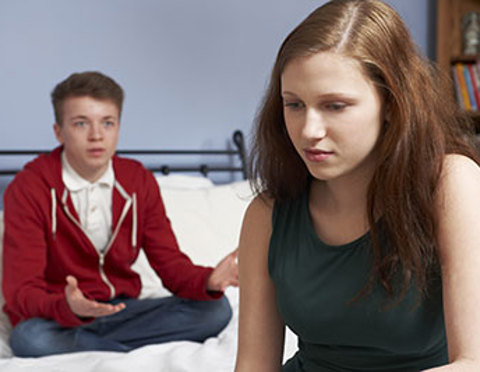Healthy relationships and consent
Information and advice for parents on safe sex and consent
Having an open and honest home environment where everyone is comfortable talking about bodies, sex and relationships is a key factor in helping children develop into healthy and confident adults.
As they become teenagers and the reality of sexual activity increases, are there other aspects which will help your child have safe, healthy and happy relationships?
Things to consider
- Your child will learn about sex and relationships from a wide variety of places – friends, online, school – or even pornography. This can be confusing and intimidating. Quite often peer pressure makes young people believe they have to know and understand it all – even if none of them actually does! Giving them a safe and open place for them to ask and talk will help them make sense of it all.
- Help them understand what sex is – not always intercourse but touching, oral sex, masturbation.
- Contraception and safe sex – it’s not just for girls. Make sure your child knows that safe sex is everyone’s responsibility. Try to talk to your child about contraception before they start having sex, not once it’s begun. If they want you can explore different options with them and talk over what might work best for them. Remind them that only condoms can prevent sexually transmitted infections (STIs).
- Make sure they understand and respect consent. Make sure they understand that it’s okay, that it’s their right, to say NO at any time (see below).
Respect is something we model as adults and carers. Children learn by example and see how respect should be earned by the actions of the adults around them. Respecting your child’s views in every day family life will help them with relationships with friends, and when it comes to sexual relationships.

Consent
Consent means agreeing to do something in an informed way.
Have a conversation about consent and what it means in the context of sex. It is vital that your child knows that any sexual encounter without consent is illegal.
No means no, regardless of when or where, regardless if it’s happened before or if you said “yes” 10 minutes ago.
Consent is not just verbal, it can be said through body language or behaviour. Help your child to understand this and to respect themselves and others.
Some tips for talking about consent and relationships:
- To help them make good decisions – talk about sex and relationships. Being in a relationship doesn’t mean it has to be sexual. Explore what they want and what their partner wants – a relationship or sex? Help them recognise signs of control, pressure and abuse – e.g. “If you love me then you’ll have sex with me” is not love.
- Acknowledge that lots of things can influence their decision to have sex – peer pressure, self-esteem, emotional bullying and simply ‘liking’ someone. But help them accept what feels right and what doesn’t. And if it doesn’t feel right, then it’s not.
- Talk about what happens when alcohol or drugs are involved and encourage them to consider how clearly we are able to think when under the influence of any substance.
Tea and consent
Consent for kids
Advice for children and young people
Childline offers clear, helpful advice and support to children and young people around the issues of sex and relationships. It may be helpful to suggest this to your child.
Harmful sexual behaviour
Harmful sexual behaviour is behaviour which may be harmful to another person (such as unwanted touching or advances). It can also be behaviour which may be harmful to the child themselves even if not directly to someone else (e.g. a child exposing themselves).
Harmful sexual behaviour can sometimes, particularly with younger children, be a sign that the child has suffered sexual abuse themselves. If you need support to look into this, please get in touch. We’ll help you to work out your options and what you can do about this in a sensitive and supportive way.



